Search
Showing 10 of 1803 results for NARSC 2016 July student registration fees
-
Apply – Tono
Application
An application must present a specific academic research project of high quality, on which the New Zealand and German institutions intend to work together in a complementary manner.
The New Zealand and the German partner institution must both submit an application. Applications submitted by only one party will result in exclusion from the selection procedure.
• The Project Coordinator applies on behalf of his or her institution and is responsible for the administration of the funding.
• The Principal Investigator (PI) is responsible for providing the scientific information and can also act as the project coordinator.
• Team members may be Master’s or PhD students, Postdoctoral researchers, experienced researchers or academics at a New Zealand institution.Application Guidelines and Required Documents
The following information must be provided, and documents must be uploaded to the application portal:
• Project application (in the application portal)
• Financing plan (in the application portal)
• Project description (Download here) (up to 10 pages)
• Research profile/CV of the New Zealand Principle Investigator (up to 3 pages)
• Research profile/CV of the German Principle Investigator
• List of project-relevant publications by the New Zealand Principle Investigator in the past 5 years (up to 4 pages)
• List of project-relevant publications by the German Principle Investigator in the past 5 years (up to 4 pages)
• Brief CVs of any other project participants that have already been selected at the time of application (up to 3 pages)
• Confirmation from the project assistant if applicableSubmissions and amendments, including to the financing plan, submitted after the application deadline will not be considered. Incomplete applications will be excluded from the selection process.
Selection
All applications will be evaluated by a selection panel that includes senior academics.
Key selection criteria include:
• Technical and content-related quality of the project in relation to the achievement of the project and programme objectives (weighting: 60%)
• Quality and rigour of the project planning (weighting: 20%)
• Appropriate participation of early career researchers (weighting: 10%)
• Consideration of diversity (weighting: 5%)
• Climate-sensitive project organisation (weighting: 5%)Apply
Applications for the 2024 are now closed.
-
Funding available to reimagine international education
Registrations of interest are open now for ENZ’s International Education Product Innovation Fund (PIF), closing on Wednesday 4 May 2022. Funding is available to all New Zealand-based organisations and individuals with fresh ideas for international education.
The PIF will support providers of education – whether established, new or emerging – to explore, develop and test pilot projects of new products and services that reimagine international education.
“New” could mean the mode of delivery, the configuration, the learner experience and learner outcomes, or the type of collaboration. The pilot projects developed through the PIF will help explore what could set New Zealand apart from its competitors, how students want to engage with New Zealand education, and how to increase the sector’s resilience to future shocks.
“We are extremely excited to now be receiving registrations of interest for the Product Innovation Fund”, says Euan Howden, ENZ’s Director of Innovation. “By encouraging and enabling the development of new, innovative products and services, we are seeking to position the sector for a more sustainable and resilient future and take advantage of trends such as alternative credentials, life-long learning and flexible learning.”
Underlying the PIF is the principle of tukutuku, or partnership. Each pilot project supported through the PIF will be a partnership based on mutual benefit and reciprocity between ENZ and the provider.
ENZ will offer funding of up to $300,000 per pilot (but is open to considering proposals that seek greater funding), as well as connections, support and credibility. In turn, ENZ is looking for applicants who can show a commitment of resource, a willingness to share lessons, reporting and insights for broader benefit, an openness to new thinking, and willingness to give best effect to Te Tiriti o Waitangi.
The PIF is one of ENZ’s initiatives underway to build a sustainable and diverse international education sector for New Zealand which is more resilient to future shocks such as COVID-19. The programme is funded by the Covid Response and Recovery Fund and is linked to the Government’s Strategic Recovery Plan for International Education.
The results of the pilots supported through the PIF will eventually inform recommendations to the Government in September 2023 on future investment in the development and diversification of international education.
-
Report from GHEDEX 2022
This year saw a welcome return to an in-person event, attracting good numbers of students and international education stakeholders. ENZ showcased New Zealand as an education partner for Oman during the “Quality in Higher Education” conference that took place alongside GHEDEX. While in Muscat, ENZ also hosted an event for Omani alumni of New Zealand universities. Twenty-eight attended, from seven universities, providing a useful networking opportunity.
Officials at GHEDEX confirmed that as our border is reopening, New Zealand is included in the just-released Omani Ministry of Higher Education’s 2022/23 handbook for scholarships. Feedback from education agents suggests that fewer scholarship students overall are expected this year.
Dr Nadia Kasto, New Zealand Academic Advisor for the Omani Consulate-General in Melbourne confirmed that from next year, all Omani scholarship students will be able to make their own decisions about the country and university that best suit their study needs.
“All universities have to work very hard to promote themselves to Omani students in order to get as many students as they can.”
-
Kōrerorero on quality education
Panellists included
- Dr Dawn Freshwater, Vice-Chancellor at the University of Auckland, who is also the first woman to hold this role
- Dr Sandra Regina Goulart Almeida, Vice-Chancellor at the Federal University of Minas Gerais (UFMG) in Brazil
- Dr Alejandro Ceballos, Vice-Chancellor at the Universidad de Caldas in Colombia.
With simultaneous interpretation in Spanish and Portuguese, the session attracted more than 100 attendees and 350 registrations from across Latin America and Aotearoa New Zealand. Panellists shared their thoughts on gender equality, integration, and inclusion, and how to achieve more equitable access to quality education. They also discussed the main priorities and focus of their institution in relation to SDG 4, and how they overcome challenges to achieve the SDG’s objectives.
Education New Zealand Manapou ki te Ao’s Kōrerorero webinar series is intended for academics, education agents and media in Latin America and New Zealand. It has been particularly effective in maintaining awareness of a New Zealand education while our borders are closed, while also contributing to discussions on important matters related to international education. Across the six episodes since its launch in 2020, more than 1,000 people have attended, with many subsequent views on YouTube.
If you would like to watch this episode, please click here
-
Delegation promotes NZ in Japan
Arrangement with Japan Women’s University
An Education Cooperation Arrangement with Japan Women’s University (JWU) was signed on 22 April by Dr Ryoko Imaichi, Chancellor, Japan Women’s University Educational Corporation, and Grant McPherson on behalf of Education New Zealand Manapou ki te Ao. The Prime Minister was also present and spoke at the event.
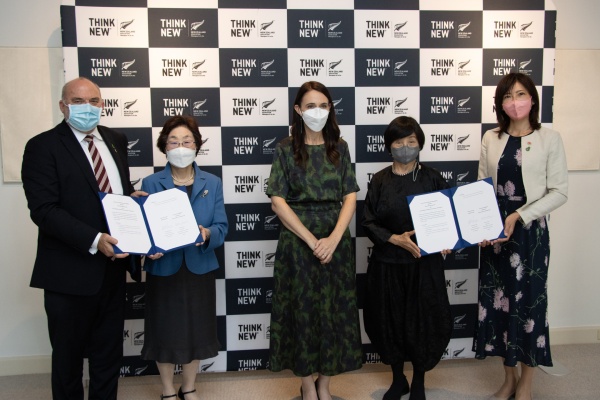
Image above: From left, Grant McPherson, ENZ, Dr Ryoko Imaichi, Chancellor, Japan Women’s University Educational Corporation, Prime Minister Jacinda Ardern, Professor Satoko Shinohara, President, Japan Women’s University, Misa Kitaoka, Director of Education – Japan, ENZ
The partnership with JWU will see more students from the university and its four affiliated schools come to study in New Zealand. Eleven university and school students from the JWU network attended the signing ceremony and spoke with the Prime Minister about their pre-COVID 19 experiences travelling to New Zealand.
This event came shortly after the Prime Minister met with her former homestay sister from over 30 years ago. The homestay sister also attended the signing ceremony, where the Prime Minister spoke about her personal experience of international education, including hosting homestay students in New Zealand and studying abroad at Arizona State University.
“Like Japan, New Zealand is a long island nation from north to south, and while being influenced by diverse cultures, I deeply sympathize with the historical background that has led to the present. Moreover, the current New Zealand society, which embodies world-leading sustainability, should be a great learning experience for our students,” Professor Satoko Shinohara, President of Japan Women’s University, said.
In Japan, there is a strong focus on the United Nation’s Sustainable Development Goals at the national and institutional level. Gender equality has received more emphasis in recent years and the new arrangement is timely for many reasons, as New Zealand and Japan focus on reconnecting to look towards the future.
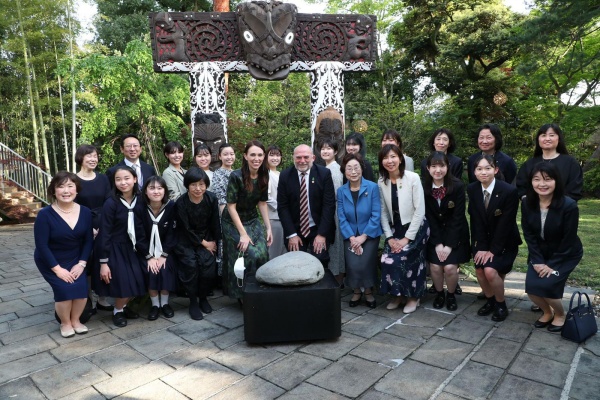
Relaunch of Game On English
The Prime Minister, alongside the President of Fonterra Japan, Yasuhiro Saito, and the Commissioner from Japan Sports Agency, Mr Koji Murofushi, relaunched the Game On English programme that had been paused due to COVID-19. The 2022 phase of Game On will see female rugby players travel to Hamilton to study English and receive high-performance rugby training, sponsored by Fonterra.
Originally launched in 2014, during former Japanese Prime Minister Abe’s visit to New Zealand, Game On English was an initiative that allowed New Zealand to support Japan’s efforts to lift international skills and English language capability while also supporting rugby skills development in the lead up to the Olympics and Rugby World Cup 2019. More than 195 female and male high school rugby players have visited New Zealand to participate in the three-to-four-week programme.
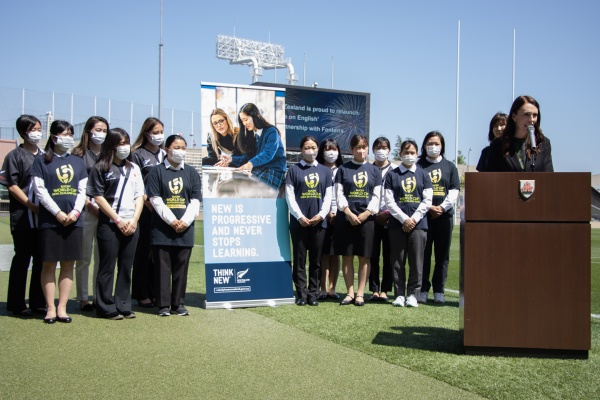
Image above: Prime Minister Ardern speaks at Chichibuya Stadium in Tokyo on 22 April 2022 to support the relaunch of Game On English for female rugby players to study English and receive rugby training.
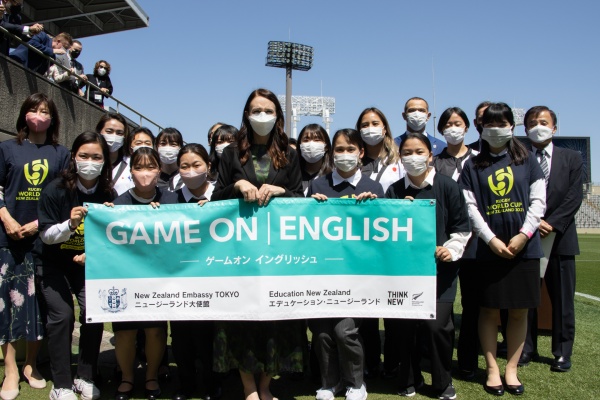
Working Holiday Scheme students
Former Working Holiday Scheme participants from Japan were invited to an event held at Cookie Time Harajuku (Tokyo) store. Several students spoke about their work or study experience, and a recurring theme was how New Zealand changed their life. Working Holiday visa holders from any country can study for up to six months while on a working holiday visa in New Zealand.
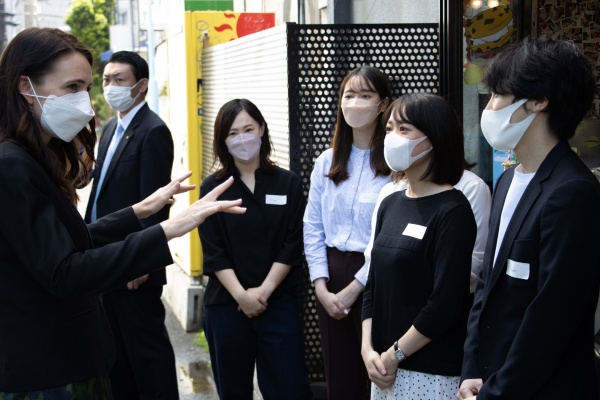
Image above: Prime Minister Ardern speaks to former working holiday visa holders about their work and study in New Zealand.
There has been extensive media coverage of all three events in Japan, including via national newspapers and TV stations. This coverage will support ENZ’s promotional activities before the New Zealand border reopens on 2 May 2022 to short-term students from Japan, as a visa-waiver country.
-
Upcoming offshore events related to international education – April 2022
Dates
Event
Location
8 - 11 May
International Conference & Exhibition for Education (ICEE)
Organised by the Saudi Ministry of Education, the conference has this year opened to wider participation. ENZ will host a pavilion with New Zealand universities, English language schools, and EdTech companies.
Contact: Bronwyn Shanks
Riyadh, Saudi Arabia
16 – 18 May
IECA Spring Conference
The Independent Educational Consultants Association (IECA) is a not-for-profit, international professional association representing experienced independent educational consultants. ENZ plans to attend to develop networks of IECs.
Contact: Lewis Gibson
North America
22 May
Study with New Zealand Virtual Fair
A co-funded virtual exhibition between ENZ and one of our ENZRAs in Viet Nam, IDP. The online session will promote New Zealand as a high-quality study destination and offers an opportunity for New Zealand institutions to communicate directly with potential students and parents.
Contact: Van Banh
Viet Nam
29 May, 4, 5 June
Code Camps – Future Proof Interactive series
A series of five code camps for Vietnamese school students, in a collaboration between ENZ and Code Avengers. The aim is to promote New Zealand’s future-proof education.
Contact: Van Banh
Viet Nam
31 May – 3 June
NAFSA: Association of International Educators annual conference 2022
This is the largest international education conference in the world, and this year’s theme is 'Building Our Sustainable Future'.
Contact: Lewis Gibson
Denver, Colorado, USA
13-16 September
European Association for International Education (EAIE)
EAIE is the largest business-to-business conference and international education event in Europe. This year’s theme is ‘The Future in Full Colour’. ENZ will host a pavilion with New Zealand universities and ITPs and run a networking event to engage with existing and new contacts face-to-face.
Contact: Olga Elli
Barcelona, Spain
14 – 15 September
Asia Pacific Technical Vocational Education and Training (APAC TVET) Forum
A partnership between ENZ, Te Pūkenga and Skills Consulting Group showcasing NZ vocational sector and its expertise. The forum will include academic and business-to-business/government-to-government elements, bringing together stakeholders across Asia and the Pacific to share expertise and capability.
Contact: Richard Kyle
Online –Asia and Pacific wide
21 – 29 October
China Education Expo (CEE)
Annual exhibition tour hosted by China Education Association for International Exchange (CEAIE) since 2000.
This major conference and expo is the leading international education event in China.
Contact: Jane Liu
Beijing, Guangzhou, Chengdu, Shanghai
-
Around the world in five – April E-News 2022
International
ENZ online education pilot extended
Education NZ to roll over Recognised Agency scheme to end of year
International learners stay cool on studying Down Under
Universities in ‘no mood’ to rush back to HE globalisation
New Zealand
International postgraduate students treated 'like massive drain on society'
Te Pukenga shares International Education Strategy
Financial hangover for Wintec, Waikato University as international students trickle back in
MIL-Evening Report: Open letter to Minister Faafoi – an appeal to help 34 abandoned Papuan students
Host families needed in Tauranga
Dunedin firm’s education tool a winner
India
Japan
New Zealand Relaunches Innovative Rugby and English Study Programme
Latin America
It's time to talk about educational quality at Education New Zealand's first Kōrerorero
Visions and perspectives on quality education in Latin America and Oceania
Saudi Arabia
South Korea
Thailand
Otago University New Zealand hybrid 2nd generation recruitment
Viet Nam
Opportunities for teachers to catch up with the wave of digital transformation in education
-
Research communication platform for Asia-Pacific
The Context: Asia-Pacific is where you can get quick, plain language overviews of high-quality academic research. Recent stories include one about cultural intelligence research. Other examples include the capabilities that SMEs need to succeed in international markets.
The platform will also include youth voices from tertiary students interested in global engagement. You can subscribe to email newsletters to receive updates about your area of interest.
The Centres of Asia-Pacific Excellence were established by the government in 2017, to support New Zealanders to engage with North Asia, Southeast Asia and Latin America.
-
ENZ to launch major global brand campaign, I AM NEW
As we re-enter a competitive global environment, the brand campaign will look to articulate the high quality of New Zealand’s education experience in a deliberately unique, ownable and attention-grabbing way.
This major campaign will initially run for 12 weeks, complemented by in-market activations, events, and local PR. It will feature eight students from all over the world, spanning across our education sector and regions.
Education New Zealand Manapou ki te Ao invited our eight students to work alongside world-famous Māori fashion designer Kiri Nathan to collaborate on designing a new type of education garment that embodies the cultural values that make a New Zealand education unique: manaakitanga, kaitiakitanga, and the pōtiki spirit of youthful energy and finding a better way. Through the narratives we tell focussed on the students’ experiences and goals, we’ll explore themes such as work and career readiness, sustainability, and innovation through collaboration.
Campaign assets will be available on The Brand Lab, with reporting data to be shared regularly. We look forward to reopening New Zealand education to the world in an inspiring way that only New Zealand could deliver.
-
Sharing our stories about international education
As we prepare for more international students to return to New Zealand, we want to ensure these important guests feel welcome and appreciated by Kiwis. Each time students arrive on our shores, we have a moment to spotlight why international education is great for our communities and the country.
We’ve recently added some new case studies to our Skills Lab website - read more about a successful storytelling example from Hawke’s Bay here.
Many great stories come from the compelling research projects being led by international students in New Zealand. These stories align with our story framework by highlighting how international education helps to shape global citizens and solve the world’s problems.
For example, Dr Htin Lin Aung, a researcher at the University of Otago, is conducting ground-breaking research on tuberculosis (TB), the world’s second-leading infectious killer after COVID-19. Read more about this case study of a newsworthy story about a scientific breakthrough here.
Stories of international education in your organisation, school or region do not have to be serious or complicated. Often, the most intriguing news stories are of everyday people doing good in their communities.
We refer to these as “soft-news” stories, as they are underpinned by a human-interest angle. You can successfully land these stories if you make sure to include the key elements that make up a news story. You can read about how Learning Hawke’s Bay landed a positive story about international education here.
Stories can often have a strong local flavour, which is appealing for local media channels.
This case study will explain how Tauranga’s economic development agency Priority One planned three news stories within the space of a month, a strong example of how a series of stories can quickly build momentum and newsworthiness at a local level. You can read more about this case study here.
If you haven’t used Skills Lab or Brand Lab before, you can sign in through MaiENZ here.
Download Communicating the benefits of international education – a toolkit from Brand Lab.
Latest case studies on Skills Lab:
- Social Licence: Determining a link to Education New Zealand’s new social licence narrative https://skillslab.enz.govt.nz/case-studies/social-licence/
- Social Licence: Developing newsworthy stories about scientific breakthroughs https://skillslab.enz.govt.nz/case-studies/social-licence-scientific/
- Social Licence: Getting feel-good stories on the front page https://skillslab.enz.govt.nz/case-studies/social-licence-feelgood/
- Social Licence: Crafting a story that resonates at a regional level https://skillslab.enz.govt.nz/case-studies/social-licence-regional-level/

